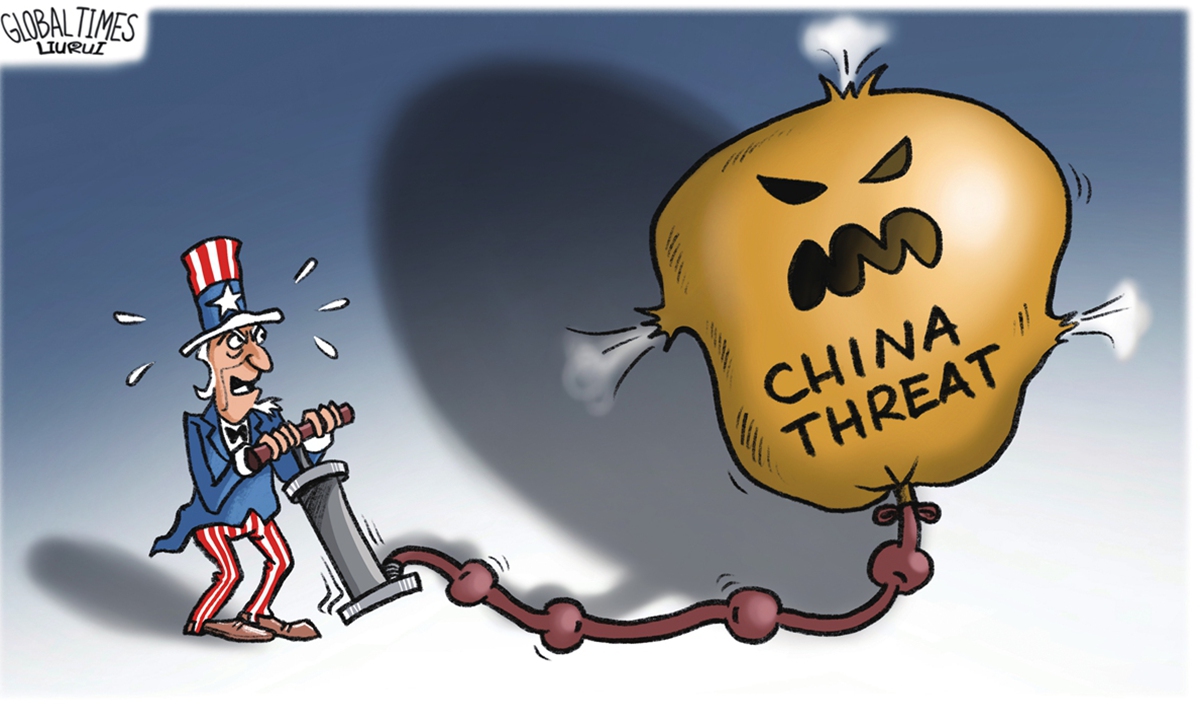
Bloated hype beyond all reason. Illustration: Liu Rui/GT
CNN reported on Monday that "a growing number of states are considering or have passed measures this legislative term to ban 'foreign adversaries' and foreign entities - specifically China - from buying farmland." These bills could violate the US Constitution, and also fuel an atmosphere of racism and anti-China sentiment.
Lü Xiang, a research fellow at the Chinese Academy of Social Sciences, told the Global Times that these states have seriously deviated from the constitution. If the rule of law is disrupted in a country, it will inevitably lead to political chaos. Several incidents, including politicization of the issue of Chinese purchasing land, have highlighted the extensive and arbitrary defects of the US in the rule of law and also indicated the collapse of the myth of the US as a "legal paradise." Limiting the prohibition to specific groups is a politicized operation that is naked discrimination. Such bills are not aimed at protecting national security, as they claim, but rather designate China as a threat, said Liu Weidong, a research fellow at the Institute of American Studies at the Chinese Academy of Social Sciences.
The US has been discussing the so-called "purge" of China's influence, and now it is beginning to restrict China's purchase of farmland. Economic and trade investment is a normal social interaction between China and the US, and there is no political purpose. However, some states in the US are prohibiting Chinese people from buying farmland, creating new obstacles for civil exchanges between the two sides.
Overall, against the backdrop of increasingly strong anti-China sentiment in the US, it seems the "land purchase ban" is an inevitable product. Regarding the "land purchase ban," several US-China relations experts interviewed by CNN warned against knee-jerk responses and called for lawmakers to act on evidence, not suspicion. There are certainly some rational people in the US who can see that this approach violates the US Constitution. However, in the current political atmosphere in the US, all anti-China actions are politically correct domestically, those who are willing to come out and speak up are the minority and their voices are often ignored.
In fact, politicizing economic and trade investment issues, violating economic laws and market principles, as well as having anti-China sentiment will ultimately harm the US itself. This may also create huge uncertainty for future China-US relations. As Chinese Foreign Ministry spokesperson Mao Ning said, China-US economic and trade cooperation is mutually beneficial and win-win in nature. Overstretching the concept of national security and politicizing economic, trade and investment issues run counter to the principles of market economy and international trade rules, which undercuts international confidence in the US market environment.
Nowadays, the current China-US relations are in an abnormal state. US Secretary of State Antony Blinken has just visited China and made some positive statements, but we must see that the impact of domestic politics on US diplomacy is significant. Some US politicians may cause trouble at any time. They may desperately incite extreme anti-China sentiment for election purposes, which will set obstacles for China-US relations.
China will certainly do its best to maintain a stable and constructive China-US relationship. However, we must be vigilant about the process being disrupted at any time. The US is a very complex country, and now various states are trying to establish state-level anti-China bills that are obviously violate the US Constitution. "This will create huge uncertainty for future China-US relations. We need to be prepared for the future destructive role of these forces in bilateral relations," Lü said.

